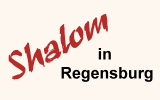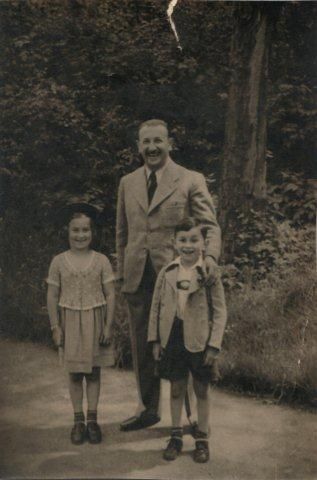|
|||||||||||
The Heymann's – family traces Wilhelm Heymann was born in 1904 in Schientochlowitz near Kattowitz (today Poland). He finished school in 1919 and went to Breslau where he was trained as a merchant. He then worked as a salesman in Berlin and Stuttgart. In 1926, he moved to Freiberg in Saxony where he worked for Schocken Department Stores ( Kaufhaus Schocken ), the largest chain of department stores in Germany at the beginning of the 20 th century. Very soon he succeeded Carl Lewin in the position as manager of the chain store in Freiberg. Wilhelm Heymann was not only successful in his job, but he also had a very happy family life. On January 1 st , 1931 he married Hildegard Brauer; the couple had two children: a daughter, Ursula, was born in December of that year, the son Norbert followed one year later. In 1934, Wilhelm Heymann was appointed manager of the chain store in Pfauengasse (near the cathedral St. Peter) in Regensburg . The family moved to a prosperous quarter in West of the city (Dechbettnerstraße 44). In the night from November 9 to November 10, 1938, the Regensburg synagogue was burnt down. Many Jewish businesses were destroyed, including the Schocken department store. In the course of the following weeks, all Jewish employees of Schocken were forced to leave their jobs, and the owners had to sell the company at a dumping price. That meant the end of a successful business, renowned for its social commitment, lifework of the brothers Schocken. Wilhelm Heymann was arrested that very night and deported to the Sachsenhausen concentration camp. For several weeks, he was at the mercy of the SS guards. After his release he returned to his family. By then it was, however, no longer possible for him and his family to emigrate on account of the strict legislation and the continual intimidations by SS and police. On April 2 nd , 1942, Wilhelm and Hildegard Heymann and their children were forced by the Nazis to assemble at the site of the former synagogue. With about 100 fellow Jews they were marched to the nearby railway station. All of them were deported to Piaski, a ghetto near Lublin in Poland, which the Nazis had turned into a transit camp. We do not know, whether the family Heymann was killed there or in one of the labour camps or extermination camps to which many Jews were transported from Piaski.
copyright © 2011 Sylvia Seifert / Zitat oder Abdruck nur mit Genehmigung des Verfassers |
|||||||||||

